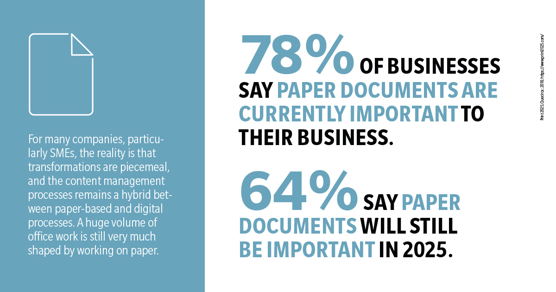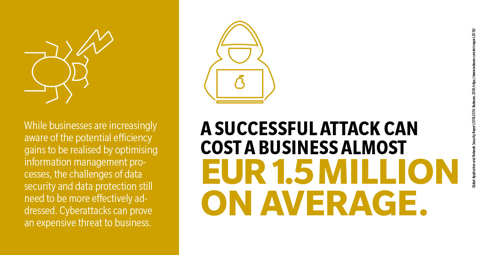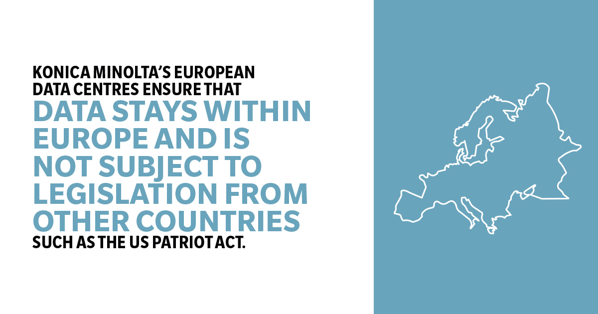Data security and compliance are paramount for all businesses. However, to meet these key objectives when managing content within an organisation, two factors must work in harmony: an information management system that provides a safe framework and a workforce that actually uses the system correctly. Necessary precautions start with having a storage location that is compliant with GDPR and that, for example, includes active security measures such as encrypted storage and backup procedures for disaster recovery. Yet even the most secure and compliant system will prove ineffective if it fails to take into account the demands of employees’ actual work lives. After all, the worst enemy of every well-protected system is a simple workaround.

Information management is still work in progress for many businesses
ith the ceaseless advance of digitalisation in business, it is important to note that this process is still a long way from being complete. For many companies, particularly SMEs, the reality is that transformations are piecemeal, and the content management processes remains a hybrid between paper-based and digital processes. Whether invoices, contracts or employee information – a huge volume of office work is still very much shaped by working on paper. According to Quocirca, 78% of businesses say paper documents are currently important to their business and, while there is an expectation that this will decrease in importance, 64% say paper documents will still be important in 2025. [1]
These everyday frustrations are no secret. Businesses today are well aware of the challenge and see significant potential to further digitalise and optimise workflows. Indeed, a customer survey by Konica Minolta across ten European countries found that 63% of organisations are planning to increase their investment in document and/or process systems.[2] For this reason, the market for information management solutions is forecast to grow significantly by 18% in the years to come.[3]

Data security and compliance are paramount
hile businesses are increasingly aware of the potential efficiency gains to be realised by optimising information management processes, the challenges of data security and data protection still need to be more effectively addressed – particularly given the severity of failing to do so: cyberattacks can prove an expensive threat to business, with research by Radware revealing that on average a successful attack can cost a business almost EUR 1.5 million.[4] As Marcel Cobussen explains: “Businesses cannot seize the opportunities of digitalisation without also addressing its challenges. No information management approach can be planned independently of data security and data protection – and vice versa. Effective security measures as well as governance of information and compliance are key.”
Thankfully, businesses are becoming increasingly security conscious. According to research by Konica Minolta, cybersecurity is now seen as being the most significant business challenge, with 33% identifying this as the main challenge overall – even ahead of factors like increasing global competition and regulatory and compliance demands.[5] However, while there is a strong awareness of the risks, many businesses need to evolve their response and view improved security and compliance as being fundamental to the processes of business transformation.
Taking a holistic approach to data security and data protection
“Businesses need to adopt a holistic security approach that is built in to information management solutions,” comments Cobussen. “While these solutions help to unlock business value, they can also fend off critical threats to business such as corporate espionage or data theft.”
This holistic approach requires protection of every data flow including data generation, processing and storage, with continuous encryption used at every stage. It also entails backups for the information management system as part of an effective disaster recovery plan. These measures are all the more important due to the increased pressures arising from legislation. For example, under Article 32 of GDPR, sensitive information in areas like HR and customer data requires very high levels of protection in terms of storage, access and processing.
Through intelligent information management, businesses can start to meet their obligations – irrespective of the hybrid nature of many businesses’ content management environment. For example, paper-based processes can make the timely deletion of data harder to ensure, but digital solutions can help to automate the governance process.
Konica Minolta delivers solutions that align products and services with real-world behaviour thanks to its customer-centric approach. By working closely with customers to understand their business, Konica Minolta ensures that solutions truly address the workflow requirements of the business and reflect employee work processes, including remote working.
Businesses demand a powerful yet protected tool for everyday work
These workflow requirements also include a high level of security. Technology is evolving to take on data security challenges, but any truly effective solution is as much about the human dimension, too. As data security measures become increasingly powerful, hackers are more often targeting the weak links that remain – employees. This is why social engineering methods that trick employees into unwittingly opening doors to malicious attacks are a growing threat. As a result, any effective data protection and data security strategy must factor employees and their behaviour into the equation.
Unrealistic expectations and policies that fail to account for human behaviour in the real world represent a significant risk.
Organisations need to base their information management approach around every day work needs, matching the actual workflows in the company. With the increasing importance of remote work, mobility should be seen as a default rather than an add-on, with easy accessibility and usability that enables secure remote working.
Due to the constant improvement of security mechanisms, social engineering is becoming one of the main entry point for attackers to gain access to a company’s systems. People’s helpfulness is still one of the easiest ways to gain the necessary information. Therefore, during a penetration test, the security consultants from Konica Minolta conduct communicated social engineering attacks to pinpoint the possibilities, while raising awareness among employees.

Konica Minolta’s approach: Tailor-made information management systems that are secure by design
onica Minolta’s product and service offerings in the field of secure data and information management include collaboration, optimised contract management, invoice processing and a smart document/ information search function. Among all solutions, Konica Minolta adopts the principal of data protection by design and by default, ensuring the data is always stored and backed up in a way that complies with applicable legal requirements.
Konica Minolta Business Solutions Europe gives their customers the ability to stay ahead of the unique and rigorous legislative environment. As a European company, data centres are located in Germany and Sweden, with new centres being established in other countries such as Denmark, for example. This ensures data stays within Europe and is not subject to legislation from other countries such as the US Patriot Act.
The commitment to ensuring the highest possible level of data security is most tangibly demonstrated by Konica Minolta’s Datacenter Syd. Located in a former military radar facility, it is one of Sweden’s safest data centres and has been created on the principle that what matters is not only how data is protected but also the location and manner in which it is stored. Equipped with the highest level of shell and alarm protection and with multiple layers of redundancy, facilities such as Datacenter Syd provide customers with peace of mind while Konica Minolta takes care of their most critical data.
Customer case: Sporrong & Eriksson creating a secure mobile environment with Konica Minolta
One of the companies to take advantage of the datacentre Syd is Sporrong & Eriksson Revisionsbyrå AB. Based in Kalmar, Sweden, the forward-looking auditors sought to leverage the opportunities of digitalisation to empower their mobile professional workforce and improve customer service while not compromising on the security of their systems. Together with Konica Minolta, the company decided to take the path of becoming truly digital. Sporrong & Eriksson wanted an IT infrastructure that meets the highest security and reliability requirements, while enabling remote work with seamless access to a high number of specialist auditing applications.
The new solution delivers a one-stop IT solution and service provided via a state-of-the-art IT infrastructure with 24/7 support from Konica Minolta and secure data storage in Konica Minolta’s high-security data centre. The move to a truly digital workplace IT solution enabled seamless yet secure remote work and file access for employees independent of their location.
Driving business forward without risk or compromise
[1] Print 2025; Quocirca; 2018; https://www.print2025.com/
[2] Improving and Automating Business Operations Through Information Management – a Benchmark Survey; Konica Minolta; 2018; https://newsroom.konicaminolta.eu/konica-minolta-information-management-survey/
[3] Global Enterprise Information Management Market 2018-2022; Technavio; 2018; https://www.technavio.com/report/global-enterprise-information-management-market-analysis-share-2018
[4] Global Application and Network Security Report 2018-2019; Radware; 2018; https://www.radware.com/ert-report-2018/
[5] SME I.T. Pain-point survey for Konica Minolta; Opinium; 2018; https://newsroom.konicaminolta.eu/smbs-are-settling-for-technology-that-underdelivers-new-survey-reveals--countering-this-konica-minoltas-workplace-hub-is-set-to-simplify-it-for-customers/



